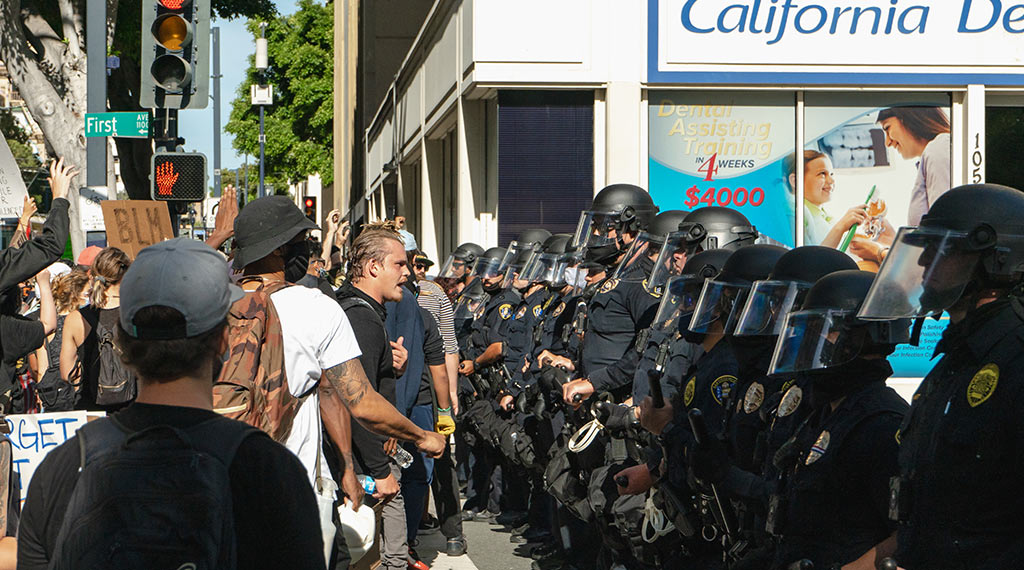Situation Report: Insider threat exposed in San Diego Antifa conspiracy case

The on-going conspiracy case against 11 Antifa members by the San Diego district attorney’s office continues to bear fruit revealing the inner workings of this dangerous movement.
According to new filings, and first reported by Andy Ngo and Eva Knott at the San Diego Reader, San Diego prosecutors allege that one of the indicted Antifa members, Jesse Cannon, used his romantic relationship with an investigator in the Public Defender’s Office to acquire information ranging from “addresses, license plates and surveillance photos of targets and their families.”
This information was later allegedly used to intimidate witnesses and victims in the case. Prosecutors also claim Antifa members acquired sensitive documents including police reports to create a target list which included: “victims, witnesses, police officers, elected officials and ‘even their own members who have fallen out of favor.’”
According to the filing, Leah Madbak, who serves in the San Diego Public Attorney’s Office, possessed administrative privileges for the Antifa social media accounts “SDagainstFash, SDreportingcollective, SNAIL Cru and RABID.” Allegedly Madbak and Cannon used these accounts to dox targets, revealing personal information in a malicious attempt to put the targets at risk.
The conspiracy case stems from a January 9, 2021 “Patriot March” in which Antifa members allegedly conducted a preplanned attack against supporters of former President Trump holding a First amendment-protected demonstration. The attack spiraled into an assault against random beachgoers and bystanders.
The San Diego District Attorney’s Office filing shows a great deal of sophistication in its understanding of Antifa, a credit to that agency. Notably, the filing makes explicit reference to Antifa “affinity groups,” which are the core structure of anarchist and autonomist extremist organizing, as the Center described in testimony before the U.S. Senate Judiciary Committee in August of 2020.
While the most visible aspect of Antifa is the “black bloc” –units of Antifa members which serve as the violent vanguard for riots and other criminal acts– the majority of Antifa’s organizing is focused on the key tasks of conducting intelligence-gathering and reconnaissance against the movement’s enemies, which include political opponents as well as law enforcement.
Rose City Antifa, the oldest Antifa chapter in the United States has been documented teaching intelligence gathering and surveillance as part of a six month indoctrination process for potential new cadre. Antifa groups have repeatedly demonstrated the capability to conduct sophisticated infiltration of groups they deem Far-Right opponents, both through technical means as well as through inserting undercover assets. In some cases, Antifa groups have effectively co-opted such groups in fairly sophisticated counterintelligence operations.
Antifa’s tendency to recruit among members of other left-wing political organizations means that it has no shortage of access to potential assets among upwardly mobile young professionals who may become positioned to access government information. Antifa also has close ties to the radical National Lawyers’ Guild, whose attorneys have a history of participating in doxing and other activities outside of the traditional attorney-client relationship.
Local, State and Federal law enforcement should be aware that Antifa represents a significant potential insider threat to their operations. Adequate knowledge of local Antifa cells, their ideology and tactics is essential to conducting successful investigations and prosecutions of Antifa groups. If San Diego should prove successful in its conspiracy prosecution, it should prove a model for local law enforcement moving forward.
- How to Prosecute the Tesla Bombers - March 31, 2025
- Tesla attacks and domestic terrorism: Kyle Shideler - March 24, 2025
- Modern Minutemen: Vital Considerations to Secure America’s States in the 21st Century - March 17, 2025
